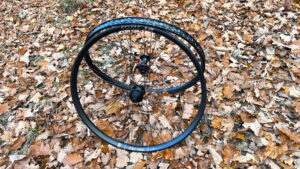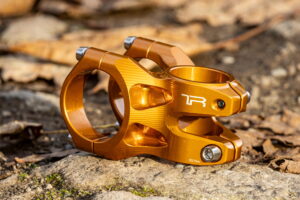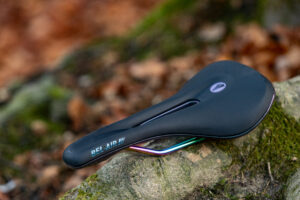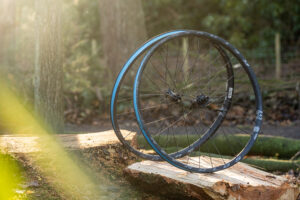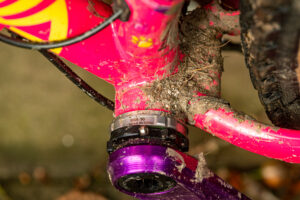A classic all-mountain tyre with a distinctive paddle tread that still cuts it against more modern options.
Maxxis High Roller II Double Down tyre review
The Maxxis High Roller II is a classic all-mountain and downhill tyre. Its ten-year-old design uses chunky edge blocks for cornering bite separated from aggressively-ramped central paddles (that roll fast one way and brake hard the other) by a wide and well-defined ‘grip channel’.
Read more: Buyer’s guide to the best mountain bike tyres
The High Roller II has been re-engineered to fit today’s wider rims, but has fallen from favour a little, likely due to newer and more hyped models appearing on the market. So using it as a rear control tyre on enduro bike tests recently has been like getting reacquainted with an old friend.

There’s a near perfect balance of grip, reasonable rolling speed and superb braking bite, even in the wet or on looser dirt. Two 120tpi layers in this DD version make it tough and resistant to cuts and damage in most UK terrain, and still a little lighter to drag uphill than most other enduro/DH halfway-house options. It’s also comfortable and dull, if not quite as conforming as the (almost 200g) lighter EXO model that deforms better, but also rips more easily in rocky areas.

The HR II is great on the rear where the distinct space between the shoulder and central blocks adds dynamism and facilitates aggressive lean angles when driving the bike with your feet. This groove also delivers a ton of cornering hold and off-camber bite, and the tread seems to rail turns and cut into banking, even when pitched right over.
This broad grip channel is shared with the (faster rolling/worse braking) Maxxis Dissector, and, like that tyre, the HR II can feel a bit vague on the front with less continuous cornering grip than an Assegai; another reason its popularity may have waned, and one of the main reasons why we prefer it as a rear option.
Verdict
Like plenty of other Maxxis tyres, there’s the right blend of suppleness, support and damping here. Some brands do individual criteria better, but few offer such assured all-round performance as the Taiwanese firm, and that’s why its tyres are such a hit around these parts. The only things preventing it from achieving a perfect ten are that the ramped blocks lack bite on slimy climbs and the £75 price tag.










